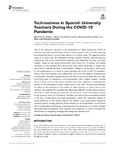Technostress in Spanish University Teachers During the COVID-19 Pandemic

Use this link to cite
http://hdl.handle.net/2183/27794
Except where otherwise noted, this item's license is described as Atribución 4.0 Internacional (CC BY 4.0)
Collections
- Investigación (FEDU) [938]
Metadata
Show full item recordTitle
Technostress in Spanish University Teachers During the COVID-19 PandemicAuthor(s)
Date
2021Citation
Penado Abilleira M, Rodicio-García M-L, Ríos-de Deus MP and Mosquera-González MJ (2021) Technostress in Spanish University Teachers During the COVID-19 Pandemic. Front. Psychol. 12:617650. doi: 10.3389/fpsyg.2021.617650
Abstract
[Abstract] One of the measures adopted by the government of Spain during the COVID-19 pandemic has been the elimination of face-to-face classes in all universities, requiring that all teachers had to conduct their classes in an online mode. The objective of this article is to study how this adaptation among university teachers affected their job performance due to the technostress (objective and subjective) that they may have suffered. Based on the person-environment misfit theory (P-E fit theory), the sample consisted of 239 teachers from face-to-face and online universities in Spain who were asked to identify the type of technostress, feelings of technostress, and impact on job performance as a result of online teaching due to the COVID-19 pandemic. Results show that teachers who suffered the most from the negative consequences of technology have been female teachers from face-to-face universities who are older, have more years of experience, and consequently, hold a higher position. Despite previous results none of the above variables have been significant in explaining the decline in job performance during confinement. It was also observed that although the effect on job performance was similar for online teachers as well as face-to-face teachers, the variables that explained this effect were different. For the online teachers, there was a misfit between the demands and resources, which are explained based on the previous theory (P-E fit theory). Teachers from face-to-face universities pointed to the lack of instructions from their organization, along with subjective feelings of techno-inefficacy, as the reasons behind the decline in job performance during the lockdown period. Looking ahead to future research on the incorporation of information and communications technology in teaching work, it is necessary to consider variables associated with technostress, both objective and subjective, in order to increase the effectiveness of integrating emerging technology into teaching work.
Keywords
Technostress
University
Teacher
Job performance
COVID-19
University
Teacher
Job performance
COVID-19
Editor version
Rights
Atribución 4.0 Internacional (CC BY 4.0)






